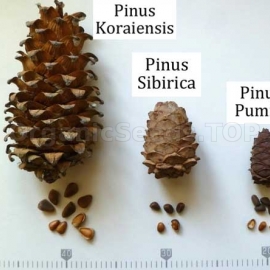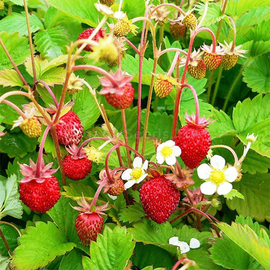 SALE
SALE







Organic Korean Pine Seeds (Pinus Koraiensis)
1.50 €
2.50 € (Discount: 40%)
Korean Pine nuts are the most commonly sold pine nut in international commerce. Fresh (shelled) pine nuts often sell for as much as $25/lb. Also known as pignoli nuts, Korean pine seeds can be consumed as a healthy source of protein.
-
Organic Korean Pine (Pinus Koraiensis)
Korean Pine nuts are the most commonly sold pine nut in international commerce. Also known as pignoli nuts, Korean pine seeds can be consumed as a healthy source of protein and other nutritional benefits. They are a key ingredient in pesto sauce and pignoli cookies. Pinus Koraiensis seeds can also be planted to grow bushy, ornamental evergreen trees bearing long needles.
Korean pine trees (Pinus Koraiensis) are native to the mountain tops of several Asian countries, making them very winter hardy. Despite it’s cold hardiness, pinus koraiensis trees must be shaded for the first 2 years of their lives to prevent the bark from burning. Korean pine trees will grow slowly for the first 5 years, but they will eventually grow rapidly into impressive trees that can reach 160 ft tall.
Fully mature trees produce nuts in the pine cones. Each cone contains about 120 nuts. The pine cones fall off naturally for an easy harvest, but the nuts must be removed from the kernels, which can require patience. Pine nuts are said to have analgesic, antibacterial, and anti-inflammatory properties.
In Korea, pine nuts used as a remedy for ear aches, nosebleeds, and to promote milk flow in nursing mothers. Pine nut oil is composed of approximately 11.5%, pinolenic acid, an unusual fatty acid. Pine nut oil has even been used as a weight loss supplement.
The turpentine collected from the resin of the tree has antiseptic properties, and it can be used as a commercial solvent and a fuel. Korean pine nuts, and the resin, which has a menthol effect on the respiratory system, have been used in cases of colds, coughs, and influenza to help open up breathing passages and support the immune system. The needles can be used to make a tea that’s very high in vitamins A, C and D. Pine needle tea actually has several times more vitamin C than an orange.
Korean Pine resin has also been used internally by those with bladder and kidney complaints, and it has been used externally as a topical rub and steam bath in cases of rheumatism, burns, bruises, sores, and cuts. If you’re looking for an ornamental tree for your property, why not choose one with edible and medicinal properties? The Korean Pine is a multi-purpose choice for you to grow this season.
Growing Information:Korean Pine likes a well-drained, sandy, acidic soil. It will benefoot greatly from mycorrhizal fungi. Seeds shoudl be subject to 8-12 weeks cold stratification followed by 2-6 weeks warm. Seed sshould be buried about 1′ deep. These plants prefer semi-shaded areas. Kprean Pine is hardy to zone 3.
Products Viewed Before
Product code: 16451
1.14 €
This compact, whiskerless variety, about 20 cm tall, produces up to 400 grams of aromatic berries weighing about 8 g each. It is distinguished by its long fruiting period from May to October, high frost resistance, and ease of cultivation, even on a balco

